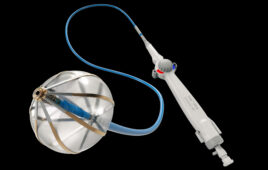
(Image from the Ischemia study)
The giant federal study that found the use of stents in stable heart-disease patients is no better than drugs to treat clogged arteries reached another, less-hyped conclusion.
Manufacturers of stents for percutaneous coronary intervention (PCI) note that the Ischemia study also concluded that patients who undergo a stenting procedure have a better quality of life. They suffer less chest pain, or angina, brought on by narrowed arteries. Specifically, the investigators concluded:
- Patients with stable coronary artery disease (CAD) and moderate to severe ischemia had significant, durable improvements in angina control and quality of life with an invasive strategy if they had angina (daily/weekly or monthly).
- In patients without angina, an invasive strategy led to minimal symptom or quality of life benefits, as compared with a conservative strategy.
- In patients with angina, shared decision-making should occur to align treatment with patients’ goals and preferences
The $100 million Ischemia study randomly assigned 5,179 patients at 320 sites in 37 countries to receive one of the two treatment strategies — routine, invasive procedures such as stent implants or bypass surgery or only medications such as aspirin or statins and lifestyle advice. Both patient groups received “optimal medical therapy” (OMT), the term for medications and lifestyle advice, with one group undergoing invasive procedures soon after having an abnormal stress test, and the other treated invasively only if symptoms worsened despite drug therapy, or in the case of an emergency (heart attack). The several forms of stress test used in the study determined the degree of blood flow restriction (ischemia) in patients’ coronary arteries.
The investigators found that for patients overall with symptoms of angina, invasive treatments resulted in better symptom relief and quality of life that persisted for four years. Among those with daily or weekly angina at the start of the study, 50% of those treated invasively were angina-free after a year, compared to 20%of those treated with medications and lifestyle advice alone.
The study’s full results will be published in medical journals starting in early 2020 and the stakes for coronary stent manufacturers are enormous. The global coronary stent market was valued at $8.3 billion in 2018 is expected to reach $15.37 billion by the year 2026 at a compound annual growth rate of 7.9%, according to an August 2019 analysis by Reports and Data.
Coronary stent manufacturers include some of the biggest publicly traded medtech companies in the world — Medtronic (NYSE:MDT), Cardinal Health (NYSE:CAH), Abbott (NYSE:ABT), Boston Scientific (NYSE:BSX), Terumo (OTC:TRUMY;TYO:4543), and MicroPort Scientific (OTC:MCRPF) — as well as privately held B. Braun, Cook Medical and Biotronik.
Boston Scientific’s shares took a -2.16% hit Monday morning following the trial results’ release on Saturday. Medtronic shares opened strongly Monday morning, but dipped slightly mid-morning, but largely recovered. Shares in ABT decreased by 1.2% from open-to-close on Monday, and remained 2.06% lower at mid-morning today than Monday’s opening of $85.76.
Abbott, Biotronik, B. Braun, and Cardinal Health did not respond to requests for comment on the study’s findings. Those who did were quick to highlight the quality-of-life findings.
“Boston Scientific welcomes additional clinical research generated to improve the treatment of patients with coronary artery disease and is encouraged that the study confirms an improved quality of life in patients with stable coronary syndromes who received ischemic guided revascularization (PCI/CABG),” the company said in a statement to Medical Design & Outsourcing. “These findings build upon more than four decades of clinical evidence that has demonstrated that percutaneous coronary intervention (PCI) is appropriate and can be life-changing for many patients.”
“Through decades of research, we know that PCI reduces ischemia and improves function in patients with CAD,” said Dr. Laura Mauri, VP of global clinical research and analytics at Medtronic. “This study reaffirms the fact that patients who suffer from persisting symptoms or encounter challenges with medication may be better suited for intervention.
“Treatment decisions for stable angina are best made by patients and their physicians on an individual and collaborative basis,” Mauri added. “We look forward to a more thorough review of the data.”
“The trial showcased decisive QOL benefits in favor of intervention for the 3-month, 12-month, and 36-month time points, especially for patients experiencing higher frequencies of angina,” added Terumo spokesperson Atsushi Hashimoto. “We regard patients’ QOL as one of the most important indicators, so we continuously strive to contribute to QOL as we do now.”
Results from Ischemia presented at the American Heart Association ’s Scientific Sessions 2019, are available here.




